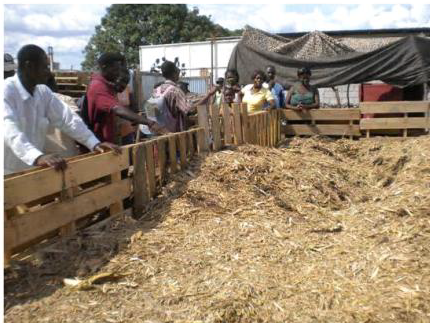
Published in: 2011
Publisher:
Sustainable Organic Integrated Livelihoods, Haiti, supported by Oxfam Great Britain
Author:
SOIL
Uploaded by:
SuSanA secretariat
Partner profile:
common upload
10493 Views
428 Downloads
Location of library entry
Content - Summary
With the support of Oxfam Great Britain, SOIL conducted a market assessment of compost and fertilizer sales in Haiti with a specific focus on indentifying possible markets for the sale of compost generated by EcoSan projects. Throughout the course of this study, the following market conditions were evaluated in detail:
1) the prices, availability and quality of the different options for fertilizer and compost currently available in Haiti,
2) the agricultural practices of small-scale farmers,
3) the results from preliminary marketing and outreach efforts to potential bulk buyers in the government and NGO sectors,
4) social responses to the idea of using EcoSan-generated compost,
5) a cost analysis of EcoSan in order to estimate the minimum sales price necessary to fully subsidize sanitation activities with compost sales. Suggestions for expanding the market for EcoSan-generated compost in Haiti including subsidies and advocacy are then suggested.
Results show that a few stores were very positive about the opportunity to switch from imported chemical fertilizer to a locally produced organic fertilizer. And most significantly, none of the organizations contacted said they would rule out the future possibility of purchasing EcoSan-generated compost if they weren’t already using it. The Ministry of Agriculture and the Food and Agriculture Organization (FAO) would potentially be interested in using EcoSan compost in the future. The Ministry’s primary reason for not purchasing compost at this point was because they had not identified a demand for it, but they said that if farmers began to request it they would try to access it for them. Also with a little effort put into marketing and outreach, SOIL was able to generate interest among several largescale buyers such as World Vision, UNEP and US AID OTI.
With compost sales alone, EcoSan projects are unlikely to break even at their current scale in Haiti because the cost to produce 100 pounds of EcoSan-genated compost exceeds the current market rate for compost in Haiti. However if compost sales are complemented by other potential revenue streams, such as private toilet collection and treatment fees, the full costs of providing ecological sanitation services are quickly covered.
Additional information
Provided by Andy Bastable at Oxfam GB for distribution by SuSanA
Bibliographic information
SOIL (2011). Can We Sell EcoSan Compost in Haiti? A Market Analysis Report. Sustainable Organic Integrated Livelihoods, Haiti, supported by Oxfam Great Britain
Filter tags
English Faeces or faecal sludge Latin America & Caribbean Peri-urban Urban (entire city) Urine diversion dehydration toilets (UDDTs)














